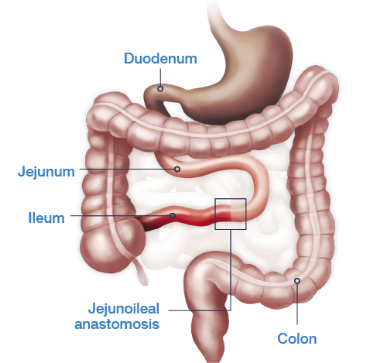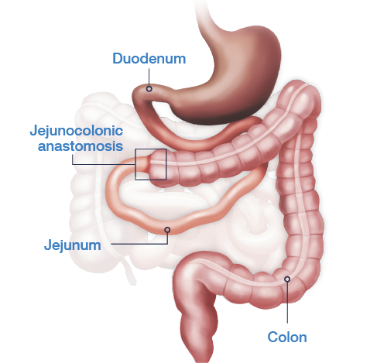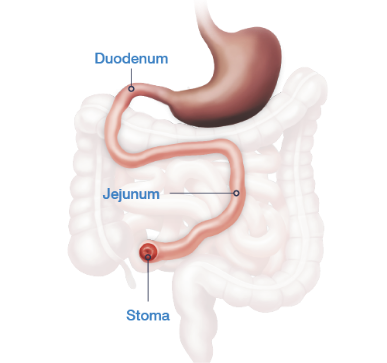Short bowel syndrome (SBS) can result from physical loss of significant portions of the small intestine or from loss of function.1 A short bowel may result from extensive surgical resection or congenital diseases of the small intestine.2 The regions of bowel loss differ among patients and varying amounts of small and large intestine may have been removed.3 The clinical condition associated with the remaining small bowel in continuity of less than 200 cm is defined as SBS.4
Intestinal failure (IF) is defined as the reduction of gut function below the minimum necessary for the absorption of macronutrients and/or water and electrolytes, such that intravenous supplementation is required to help treat or prevent malnutrition.4
Depending on the anatomy of the remnant bowel, three categories of SBS are identified.4
Jejunoileal anastomosis†
with both the ileo-cecal valve and the entire colon in continuity

Jejunocolic anastomosis†
with no ileo-cecal valve and a part of the colon in continuity

End-jejunostomy†
with no colon in continuity

Adapted from Nightengale 2001.5
† These surgeries do not always result in SBS-IF.
Pathophysiology and underlying diseases of patients who may require long-term home parenteral nutrition for short bowel syndrome intestinal failure (SBS-IF) include:2
- Mesenteric ischemia
- Crohn’s disease
- Radiation enteritis
- Surgical complications
- Familial polyposis
- Volvulus
- Intestinal malformation
- Necrotizing enterocolitis
- Gastroschisis
- Others
References:
- O’Keefe SJ, Buchman AL, Fishbein TM, et al. Short bowel syndrome and intestinal failure: consensus definitions and overview. Clin Gastroenterol Hepatol. 2006 Jan;4(1):6-10.
- Pironi L, Arends J, Bozzetti F, et al. ESPEN guidelines on chronic intestinal failure in adults. Clin Nutr. 2016;35:247-307.
- Nightingale JMD. The Short Bowel. In: Nightingale J, ed. Intestinal Failure. London, England: Greenwich Medical Media; 2001:177-198.
- Cuerda C, Pironi L, Arends J, et al. Home Artificial Nutrition & Chronic Intestinal Failure Special Interest Group of ESPEN. ESPEN practical guideline: Clinical nutrition in chronic intestinal failure. Clin Nutr. 2021 Sep;40(9):5196-5220.
- Nightingale JMD. The Short Bowel. In: Nightingale J, ed. Intestinal Failure. London, England: Greenwich Medical Media; 2001:177-198.

